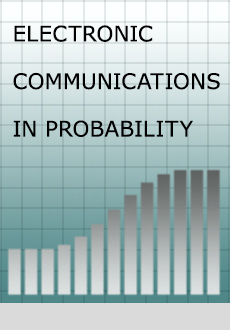Abstract
Chung, Diaconis, and Graham considered random processes of the form $X_{n+1}=2X_n+b_n \pmod p$ where $X_0=0$, $p$ is odd, and $b_n$ for $n=0,1,2,\dots$ are i.i.d. random variables on $\{-1,0,1\}$. If $\Pr(b_n=-1)=\Pr(b_n=1)=\beta$ and $\Pr(b_n=0)=1-2\beta$, they asked which value of $\beta$ makes $X_n$ get close to uniformly distributed on the integers mod $p$ the slowest. In this paper, we extend the results of Chung, Diaconis, and Graham in the case $p=2^t-1$ to show that for $0<\beta\le 1/2$, there is no such value of $\beta$.
Citation
Martin Hildebrand. "On the Chung-Diaconis-Graham random process." Electron. Commun. Probab. 11 347 - 356, 2006. https://doi.org/10.1214/ECP.v11-1237
Information





